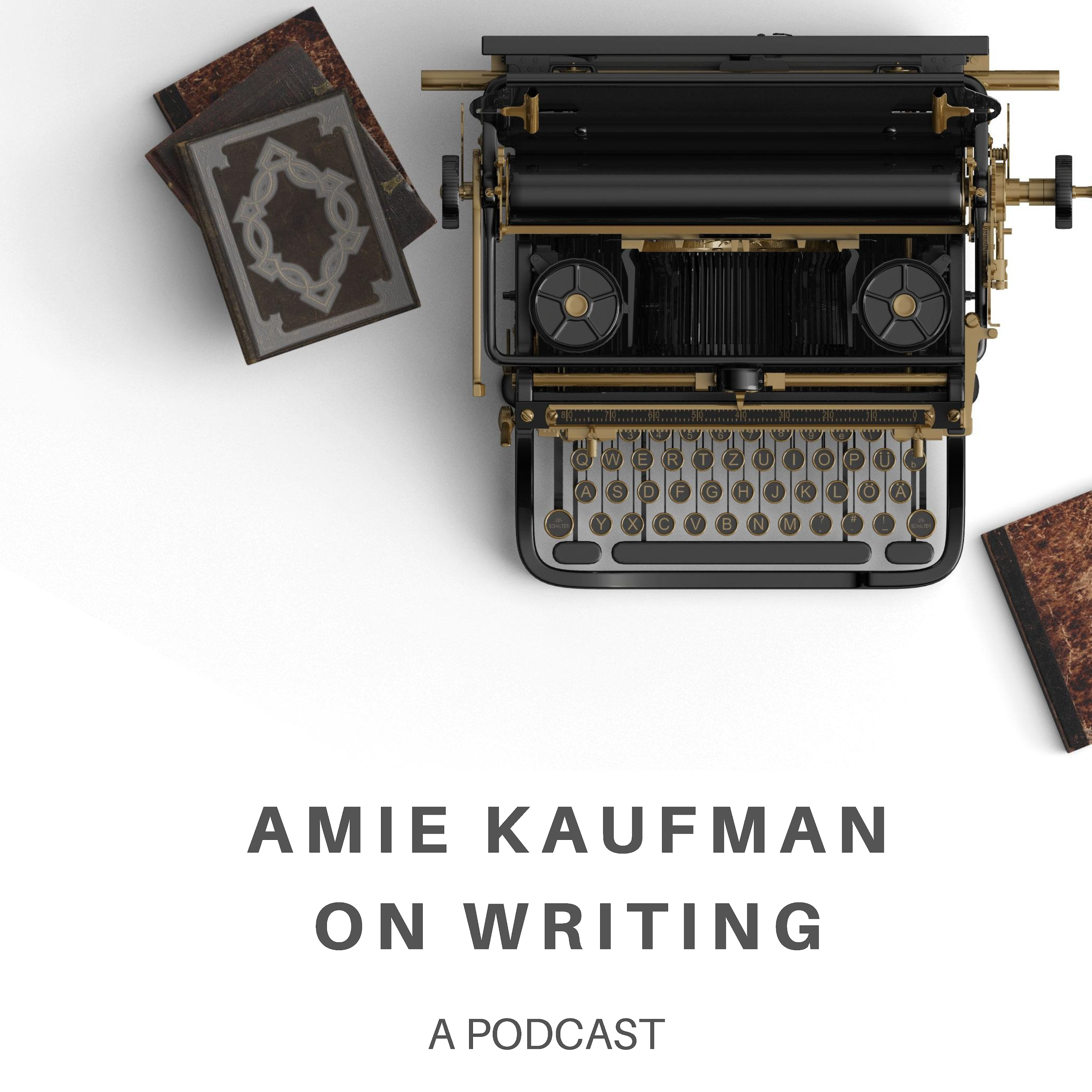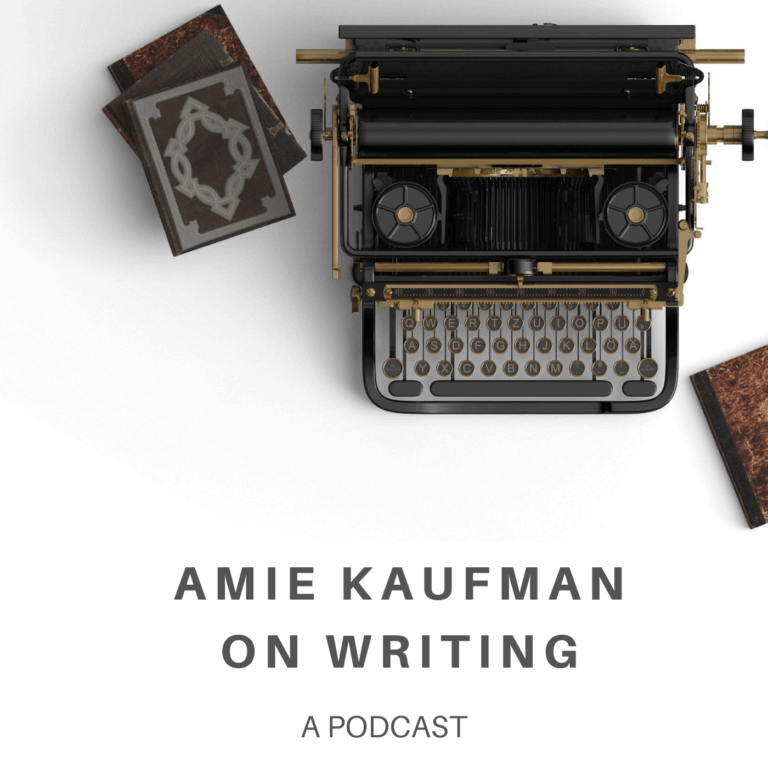Episode 2: Worldbuilding is for Everyone

New York Times and internationally bestselling author Amie Kaufman answers one question each week about writing craft. Full of practical tips and an exercise each week, this is a show for writers, for readers who want a backstage look at how their favourite authors craft their stories, or for creative writing classrooms.
Building a world for your story or your series is a huge job, and though we all know the one about how the journey of a thousand miles begins with a single step, how do you figure out which step to take first? This isn’t just a problem if you need to invent an original world—say, for a sci-fi or fantasy novel. Your novel can be set at a high school in America and still need worldbuilding. So where do you begin?
You’ll find a transcript of this episode at my website, where you can also subscribe to my newsletter, get behind-the-scenes peeks at how I write, and any other news about new books, events or the podcast. You can also submit a question for the podcast on my website. You can find me on Twitter or Instagram.

FOLLOW ON APPLE PODCASTS . FOLLOW ON SPOTIFY . FOLLOW ON OVERCAST . FOLLOW ON PODCAST ADDICT
Season 1, Episode 2: Worldbuilding is for Everyone Transcript
Hi, my friends.
Welcome to Amie Kaufman on Writing, a short podcast that answers one question each week about how writers do what they do.
If you’re a writer, or you’re a reader interested in how your favourite authors craft their stories, then you’re in the right place.
This is Season 1, Episode 2: Worldbuilding is for everyone
Here’s my friend and producer Kate with this week’s question. Hi Kate, how are you?
Hi Amie, I’m good!
This week’s question is from Sarah, who says: Worldbuilding: help! I’m overwhelmed by how much there is to do in creating a world for my novel, and I don’t know where to start or how to make it feel real. How do I begin?
Oh gosh, Sarah, I know how you feel. Building a world for your story or your series is a huge job, and though we all know the one about how the journey of a thousand miles begins with a single step, how do you figure out which step to take first?
This isn’t just a problem if you need to invent an original world—say, for a sci-fi or fantasy novel. Your novel can be set at a high school in America and still need worldbuilding. Anyone who’s ever gone from one state to another, even for a holiday, knows how many things are specific to where you are.
So where do you begin? One place you can start is with this question: What’s different about my world?
If you’re writing genre fiction, start by finding something that’s different about your world to ours. It could be magic, or a different level of technology—much more than we have, or much less. It could be location—maybe you’re in space, or on a world in the middle of an Ice Age or climate disaster.
If you’re writing something set in our world, either contemporary or historical, think about what makes this time and place different to others. The differences could be in anything from the weather to the landscape—does it snow a lot, are you in the desert, are you rural or urban—to the economy—is this area prosperous or in decline—to the food, or the size of the local population. Maybe it’s about what the local population is concerned about—a specific local development or issue, or maybe this is the type of place where everybody goes to a religious service every week, or doesn’t.
What you’re looking for are the things that make this place distinct, not necessarily from every other, but from most others. Here’s a list of places to look for your difference – and there are so many more.
- Climate and weather
- Geography
- Wildlife
- Magic
- Religion
- Technology levels
- Cities and rural areas
- Population numbers
- Health and recent illnesses
- Wealth disparity and class
- Education levels
- Family units
- System of government
The list goes on and on. Eventually you’ll look at lots of these, but at the beginning, you’re looking for one that makes your world different.
What do you do once you have it? You ask yourself: so what?
What are the ripple effects of what you’ve figured out?
How does this change impact the way everyone lives?
We can draw an example from our own lives here—not to get too real, but in 2020 we’ve seen what happens when you change the health situation on a world level, and also on a national and local level. We’ve seen the many ripple effects of having large segments of the population sick or at risk. They’ve included changes in our behavior through social distancing and staying home, and that’s then resulted in businesses and schools moving online, family communication and get-togethers changing, the way we eat and socialize changing. Everything from a sudden move to making sourdough to realizing that huge chunks of the population perhaps don’t need to commute at all. Do they even need to be in the same country as they were before? Everything’s on the table in terms of figuring out how the world changes, and I’ve barely touched the edge of the ripple effects you can find.
Let’s think about stories, though, rather than real life.
If your fantasy world is low tech, what does that mean in terms of the types of jobs people have? What happens if someone you love gets sick? How much mobility is there—both literally, as in how easy is it to get out of your town—and socially, as in how easy is it to change your class?
If you’re in a desert, how does that impact your food? Does it make water more important? Who controls the water? How hard is it to get water? Does the need to go get water for your household shape your daily routine? What does that mean for your protagonist’s chance to go to school, or get a job? My Dad once worked on a water project that provided fresh water to a village in Nepal—when they checked back six months later to see what other help the village might need, the request they got was amazing: the villagers were asking about school supplies, because with a two hour walk for water eliminated each day, the kids had more time. I wrote my history thesis on a wave of Irish migration in the second half of the 19th century that had its roots in seemingly unrelated education reform back in 1815—but my history nerddom is a whole other podcast. Suffice it to say: ripple effects everywhere.
And that’s all before we introduce magic, and start asking questions about who has it, how hard it is to access, and how it impacts the power structures in the world. Does magic get you an education? Does it help you make a living? Or is it common? Is it forbidden? What does that mean for the way magic users live?
To draw an example from my own work, this is stuff my co-author Meagan Spooner and I thought about when we wrote our book The Other Side of the Sky—if it doesn’t sound familiar, that’s because it’s coming out this September. In that book we have a science fiction city up in the sky, and a world of magic and prophecy on the ground below. When we were thinking about this city in sky, we thought: Okay, they have limited space, limited room to grow, limited resources. So how would their city adjust? What materials would clothes be made of? How would their transport function? What kinds of hobbies would they have? If they don’t have room for animals, do their metaphors turn more to birds? There are a thousand little ripples that show up and help the place our prince lives feel more real.
So, to come back to where we started, here, again, are the questions that will help you find a place to take your first step toward worldbuilding:
First, what’s different about this time or place compared to others?
Second, So what? What are the ripple effects of that? What changes does the difference cause, and what changes do those cause. And so on, and so on.
Think about it like that, and you’ve got a way into your worldbuilding, as well as a real depth and realism to it that’s going to resonate with your reader.
Here’s an exercise: Pick something to change about our own world—say, all airplanes are suddenly grounded and nobody can travel that way ever again, or you can pick your own—and write down ten things that would change as a result of it. Don’t overthink it, just jot them down and you’ll begin to see how quickly your world becomes clear.
What do you do with this world you’re working on?
Next week, I’ll be answering a question about how to show your worldbuilding without info-dumps.
In the meantime, I’ll remind you to subscribe, and leave the podcast a review wherever you listen. All this is particularly helpful around launch—especially subscribing—it pleases the algorithms, and introduces the podcast to new readers.
You can find me at my website, which is at amiekaufman.com – you can subscribe to my newsletter there, for behind-the-scenes peeks at how I write, and any other news about new books, events or the podcast. You can also submit a question for the podcast on my website. You can find me on instagram at @AmieKaufmanAuthor or on twitter at @AmieKaufman. This podcast is produced by the lovely Kate Armstrong, host of one of my favourite podcasts, The Exploress, which time travels through women’s history one era at a time. You can find her at theexploresspodcast.com.
For now, thanks so much for listening – enjoy your reading, and enjoy your writing.
Have a Question?
You can submit your question using the form using the form on the main podcast page — if you’re stuck on one aspect of your work, or you’re wondering how your favourite author pulled something off, we’d love to hear from you!
